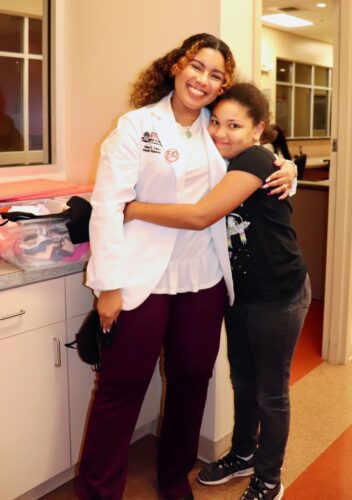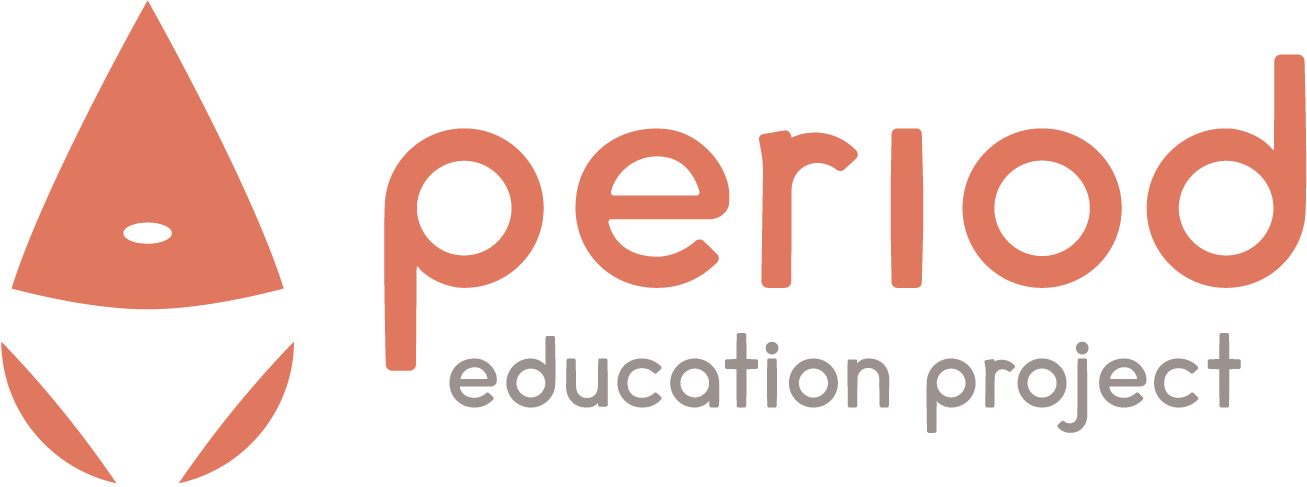Writing contributed by Lead Writer and Editor Sophia DeLuca and National Student Coordinator Priyanka Parikh
“It was one of the most beautiful moments of my life,” Shakti recalls.
This “ beautiful moment” happened under unexpected circumstances. Shakti Naidoo, a third-year medical student at the University of South Carolina, was teaching a Girlology workshop on menstrual health to a group of young girls with her fellow aspiring OB/GYN and friend, Davlyn Luke. After the workshop, “one of the girls came up to Davlyn and gave her a hug and said thank you. I could tell that that moment had been so impactful for her.”

For Shakti, moments like this one “reignite why we’re up all night studying for exams. It’s hard not to be bogged down by books and tests, but we both really enjoy going out there and talking to girls in the community. We put all the pieces we’ve gotten from school together and effect change in that way.”
The duo has been volunteering with Girlology for over a year: tabling at educational fairs and leading Girlology community events. In early 2020, Shakti and Davlyn teamed up with Dr. Melisa Holmes, Dr. Trish Hutchison and the Girlology Foundation, as part of a new educational program: the Period Education Project, or PEP as they fondly call it. PEP engages eager medical students, like Shakti and Davlyn, trains them, and partners with youth-serving community organizations. Shakti and Davlyn contributed to the program development and are the first “Period Pros,” to pioneer the program.
Led by Period Pros, the classes or “PEP Rallies” provide medically accurate information about menstrual health to youth, usually ages eleven through fifteen. The PEP curriculum is “not one size fits all – it’s a skeleton template,” Shakti says. “People can change lessons to fit the needs of the community.”
As PEP expands from its roots in Greenville and spreads across the country, Davlyn sees no end to the impact the program can have: “This program in Greenville has already effected so much change. What it could do in a large community or city is unbelievable.”
For Period Pros like themselves, equipping adolescents with the knowledge to understand their own bodies will “enrich other people but also enrich themselves,” Davlyn says.
There are “one million other necessary skills doctors need, and there is only so much medical school can teach you in the time you have,” Davlyn says. Davlyn and Shakti’s hands-on experience as Period Pros has given them a leg up. “From the jump, having that training and understanding about how to properly talk to your patients can open doors,” she says. Through PEP, Shakti says they “get to put together all the pieces we’ve learned from school” and shape generations of girls in their local community.
Davlyn acknowledges that “access to a provider” is only half the battle in securing comprehensive care. The other “half is feeling comfortable with the providers.” Many patients don’t feel connected to their doctors, and in Davlyn’s own life, she sees prevalent distrust toward medical providers amongst “adult women, from girls younger than me, and even my own friends.”
PEP Rallies serve as the perfect training ground for future physicians who want to build trust and strong relationships with their patients.
Sometimes it takes time to earn teenagers’ trust. Davlyn and Shakti have improved with experience as Period Pros. When they connect with a group, it’s so rewarding to see that “the girls actually seem excited to know more about their bodies,” Davlyn says. “Having that knowledge about yourself is power. It doesn’t get old no matter how many times you experience that excitement for knowledge and power.”
Educating and empowering young girls through PEP is just one small part of the work Shakti and Davlyn hope to do. As aspiring OB/GYNs, both see the broader implications of women’s health in communities.
“Women’s bodies, especially minority women’s, are so politicized and stigmatized” Shakti says. Improving women’s and adolescent health isn’t as simple as telling a young girl to love her body or to ignore society’s standards.
When Shakti starts practicing as an OB/GYN, she is determined to end the fear of judgment and stigma amongst her patients: “It will be a place of trust.”
In order to get there, Shakti knows she will need to learn how to navigate deeply personal conversations about women’s health, just like she and Davlyn currently do as Period Pros.
“I think that what drew me to this particular field and not something else in medicine is the idea of longitudinal care for the patient,” she says. “I can be there in my patients life for all the steps in their life. I think a lot of women want that person that is a constant for years.”
For Davlyn, longitudinal care care spans beyond impact on the individual: “In a lot of ways, being an OBGYN gives you access to the entire family. Women are the foundation of that family. Stereotypically, women are the ones encouraging doctors visits. If you can get to the root of the family. You can really implement care for the whole family.”
On the surface level, “a lot of what we’re doing is intangible, and there is no immediate reward,” Davlyn says. It’s the excitement in those young girls’ eyes, the hugs, and the curious questions after a PEP Rally that reaffirms their belief that change – striving towards an equitable healthcare system – can be realized through persistent effort. Through PEP, Davlyn and Shakti are already witnessing the ripple effect produced by educating young girls about their bodies, and “in a world that makes it seem like women don’t have power – that influence is true.”
The Period Education Project is currently looking for more dedicated, passionate, and energetic medical students. If you’re interested in learning more about becoming a Period Pro, download our Get Started Guide or get in touch through the Contact Us page.

Recent Comments